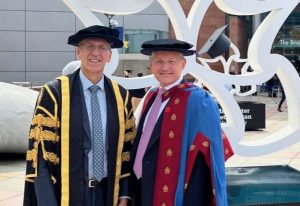Listed businesses eager to dip into NW region’s talent pool

The North West region is being targeted in a recruitment drive by the UK’s FTSE350 listed companies.
New research from Universities UK (UKK) shows that one in five (20%) of the businesses are looking to recruit talent from this region over the next five to 10 years.
UUK surveyed 100 senior leaders and talent acquisition specialists at FTSE350 companies.
Its research reveals that business leaders expect lifelong learning to become increasingly important as the economy adapts while the UK seeks to become a global superpower in green innovation, science and technology.
More than half (54%) of those surveyed say they expect the future workforce will need to retrain at least once in their career due to the rapid pace of technological change, while 56% say the Government needs to make university courses more accessible to workers in their mid-to-late career.
The survey comes as UUK launches its new report, Jobs of the Future, showing that more than 11 million extra graduates will be needed to fill jobs in the UK by 2035, more than one million of which will be needed in the North West of England alone. There are currently 15.3 million graduates in the UK workforce, so this represents a significant increase in demand.
In highlighting the need for more skilled workers, UUK has hailed universities in the North West of England for fostering highly sought after skills and experience in emerging industries.
This includes Liverpool Hope University, which offers a computer science course designed to deliver industry knowledge on topics such as robotics, Artificial Intelligence, Virtual and Augmented Reality. The university provides opportunities for its students to enjoy experiences which benefit them both academically and professionally, including the prestigious VISUM summer school.
Universities UK’s chief executive, Vivienne Stern, said: “We look forward to working with universities and the Government to make the lifelong learning vision a reality. With demographics shifting and technology evolving, it’s an exciting opportunity to make sure the UK has the higher education system it needs for the future.”
More than half (52%) of the senior figures and talent acquisition specialists surveyed by UUK said the shift to hybrid or remote working means they are more likely to recruit talent from outside major hubs, such as London, presenting a fantastic opportunity for the talent pool in the North West of England.
Indeed, 59% said the shift to hybrid or remote working has already positively impacted their business in terms of the quality of talent they can now recruit from outside of major hubs.
Around two thirds of respondents (63%) to the survey believe UK businesses need to work more closely with UK universities to develop a talent pipeline to meet their future needs, with more than half (52%) saying they will rely more heavily on UK university graduates to respond to skills gaps and workforce challenges of the future.
The Jobs of the Future report finds that globally, technology-related roles are expected to boom over the next five years, in part due to the shift to renewable energy. Digitally-enabled jobs, such as specialists in e-commerce, digital transformation and digital marketing and strategy, are also expected to grow by four million positions globally by 2027.
Alex Hall-Chen, principal policy advisor for sustainability, skills, and employment at the Institute for Directors, said: “Persistent and acute skills shortages is one of the most pressing concerns for UK businesses. The demand for transferable skills – such as critical thinking and communication – remains strong across all sectors, and the UK’s higher education sector will play a crucial role in building a talent pipeline with the skills that businesses need to thrive.”
Vivienne Stern added: “From health and tech to digital skills and education, university graduates are a vital component to the success of the economy, but it is important that we are given the tools to continue to meet this need – and to ensure that higher education is affordable and accessible while maintaining the high level of education our institutions currently provide.”
Liverpool Hope University said emerging industries are front of mind at the seat of learning. Maisha Sadia is an international student from Bangladesh who graduated from Liverpool Hope University in the summer of 2022 with a First Class Honours Degree in Computer Science.
She now works as a full stack developer at SixIntoSeven, a Liverpool-based company providing technology solutions to help local authorities and academy trusts transfer pupil information between primary and secondary schools.
Maisha had initially undertaken a work placement with SixIntoSeven, which led to her being invited to work with the company on a part time basis during the final year of her degree before gaining a full time role upon completion of her studies.
At the end of her final year, Maisha also attended the prestigious VISUM Summer School in Portugal.
VISUM, which stands for VISion Understanding and Machine intelligence, provides learning opportunities for students, young researchers and professionals with interests in computer vision and machine learning.
Maisha was recognised as one of VISUM’s top students and received an award for her performance in a mentorship programme that saw her work directly with one of the school’s industry experts.
She said: “Attending VISUM allowed me to grow and understand what I am really capable of. It has helped me recognise the power of the knowledge I have and how it can be used to bring change to the world.
“I learnt from people who are trying to use their knowledge of tech to help everyone around them, such as those who are using computer vision to try and find solutions for infertility.
“To be recognised with an award was an amazing feeling and completely unexpected because I was competing against Masters and PhD students on the mentorship programme.”








